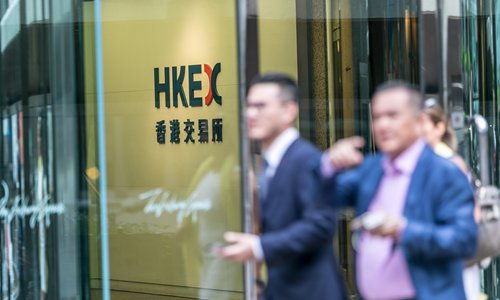HK launches first batch of MSCI Index Futures contracts
Source:Global Times Published: 2020/7/6 13:50:09

Pedestrians pass by the office of HKEX in Hong Kong. File photo: VCG
The Hong Kong Stock Exchange (HKEX) on Monday officially launched a suite of futures contracts based on Asia and emerging market benchmarks compiled by global index provider MSCI, in the latest effort to push its internationalization strategy despite pressure from the US over the implementation of the city's new national security law.
The 10 US-dollar denominated futures contracts are part of the HKEX's new index licensing agreement with MSCI Inc announced in late May. Hong Kong will introduce a total of 37 futures and options contracts in batches, benchmarked against MSCI indices.
The second batch of contracts will be rolled out on July 20, and some later contracts will be denominated in global currencies other than the US dollar, such as the yen and the Singapore dollar.
After the introduction of these derivative contracts, the HKEX will have the broadest suite of MSCI derivatives products based in the Asian time zone, according to a statement published on the official HKEX website.
Xi Junyang, a professor at the Shanghai University of Finance and Economics, said the move will further consolidate Hong Kong's roles as an international financial hub and a distribution center for global capital.
"It will attract more international capital - particularly from emerging market investors - to converge in Hong Kong," Xi told the Global Times.
Hong Kong is also mounting efforts to enhance its internationalization level at a time when the US is backing sanctions over the city's new security law, some of which might pose a threat to the Hong Kong financial markets.
According to Xi, it is possible that the US will roll out measures against Hong Kong's financial markets, such as restricting US companies' financial interactions with Hong Kong.
Such measures could harm Hong Kong's markets to a certain extent, but they won't undermine Hong Kong's role as an international financial hub because the city is open to global investors and it has some irreplaceable advantages, such as its closeness to the mainland economy, complete financial infrastructure and a convenient time zone for Asian investors to trade, Xi said.
Posted in: ECONOMY